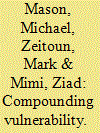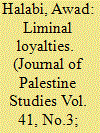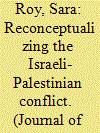|
|
|
Sort Order |
|
|
|
Items / Page
|
|
|
|
|
|
|
| Srl | Item |
| 1 |
ID:
121450


|
|
|
|
|
| Publication |
2012.
|
| Summary/Abstract |
Coping with (and adapting to) climatological hazards is commonly understood in intergovernmental and aid agency fora as a purely technical matter. This article examines the UN Development Programme's stakeholder consultations in the West Bank and Gaza Strip in order to challenge the donor-driven technical-managerial framing of Palestinian climate vulnerability by showing how Israeli occupation practices exacerbate environmental stresses. While emphasizing the importance of social, economic, and political contexts in shaping populations' responses to climate change in general, the authors demonstrate the multiple ways in which the occupation specifically compounds hazards reveals it as constitutive of Palestinian climate vulnerability.
|
|
|
|
|
|
|
|
|
|
|
|
|
|
|
|
| 2 |
ID:
121449


|
|
|
|
|
| Publication |
2012.
|
| Summary/Abstract |
The imposition of British rule in Palestine following World War I did not immediately supplant one imperial system with another or Ottoman identities with national ones. Examining Palestinian responses to the Turkish war of independence, this article argues that the 1917-22 period should be seen as a "liminal" era suspended between imperial systems. Both Kemalists and Palestinians employed a discourse of loyalty to the Ottoman dynasty, Muslim identity, and resistance to European rule to frame their goals. It was only after the creation of the Turkish Republic and the promulgation of the British Mandate, the author argues, that nationalist identities displaced Ottoman ones for both Turks and Palestinians.
|
|
|
|
|
|
|
|
|
|
|
|
|
|
|
|
| 3 |
ID:
121451


|
|
|
|
|
| Publication |
2012.
|
| Summary/Abstract |
Since its creation in 1987, Hamas has been at the forefront of armed resistance in the occupied Palestinian territories. While the movement itself claims an unbroken militancy in Palestine dating back to 1935, others credit post-1967 maneuvers of Israeli Intelligence for its establishment. This article, in assessing these opposing narratives and offering its own interpretation, delves into the historical foundations of Hamas starting with the establishment in 1946 of the Gaza branch of the Muslim Brotherhood (the mother organization) and ending with its emergence as a distinct entity at the outbreak of the first intifada. Particular emphasis is given to the Brotherhood's pre-1987 record of militancy in the Strip, and on the complicated and intertwining relationship between the Brotherhood and Fatah.
|
|
|
|
|
|
|
|
|
|
|
|
|
|
|
|
| 4 |
ID:
121452


|
|
|
|
|
| Publication |
2012.
|
| Summary/Abstract |
In the near 20 years since the Oslo peace process began, Palestinians have suffered losses-socially, economically and politically-arguably not seen since 1948. This altered reality has, in recent years, been shaped by critical paradigm shifts in the way the Israeli-Palestinian conflict is understood and addressed. These shifts, particularly with regard to international acceptance of Palestine's territorial fragmentation, the imperative of ending Israel's occupation, the de facto annexation of West Bank lands to Israel, and the transformation of Palestinians into a humanitarian issue-have redefined the way the world views the conflict, diminishing the possibility of a political resolution.
|
|
|
|
|
|
|
|
|
|
|
|
|
|
|
|
| 5 |
ID:
121448


|
|
|
|
|
| Publication |
2012.
|
| Summary/Abstract |
This essay analyzes the impact of Israeli unilateralism-specifically that of its settlement project-on the two-state solution. After exploring the relationship between unilateralism and power, the authors show, inter alia, that in-migration has accounted for about half the settlement growth since the international embrace of the land-for-peace formula in 1991, that the level of in-migration does not fluctuate according to government composition (right or left), and that Israeli-Palestinian negotiations have spurred rather than inhibited settlement expansion. The essay is framed by a contrast with the Palestinian bid for full UN membership, rejected as unilateralism by the Western powers but in fact aimed at undercutting Israeli unilateralism and creating the conditions for meaningful negotiations.
|
|
|
|
|
|
|
|
|
|
|
|
|
|
|
|
|
|
|
|
|